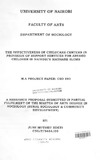| dc.description.abstract | Child abuse by all means is a huge problem in our Nation. The silence that has engulfed
it over the years has perpetrated the continuance of the vice to alarming heights. One can
understand much about how a society values its children by the laws and services it puts
in place to protect them. The child protection system both reflects and shapes its
community's values and expectations. As such, each part of the child protection system:
families, the general community, community agencies, professionals working with
children, police and Government have a significant role to play to ensure that children are
kept safe and well.
The aim of this study was to examine the effectiveness of childcare centers in provision
of support services for abused children in Mathare slums, Nairobi. Specifically the
researcher sought to find out if the presence of childcare centers has any positive function
in society and whether the staff and children in the centers and community in general
deems it that way.
This study was guided by the Social Structure and Anomie theory. This theory states that
anomie or (normlessness) occurs when societies become unstable as a result of there
being exceptionally strong emphasis' upon specific goals without the corresponding
emphasis upon the socially structured capacities of members of the group to act in
accordance with them. Child abuse in urban slums has been propagated by poverty and
the appalling situations families are subjected to, in order to survive every day. Childcare
centers step in to remedy the problems of abused children by providing substitute care for
some infinite period. Through institutional care, abused children are removed from
further maltreatment and potentially harmful situations and are provided with alternative
social, emotional and physical care. Another theory that guided this study is formal
rationality where one of its characteristics is that it involves 'means-end' calculation and
this calculation occurs within the universally applied rules, laws and regulations. In
formal rationality, there is great concern when ensuring predictability or uniformity so
that things operate in the same way from one time or place to another. Childcare centers
are managed differently depending on the available resources and personnel. When all
the factors are considered in child protection, they are to ensure that the child is rightfully
placed thus avoiding placement that may be detrimental to their growth and development.
The researcher sampled five childcare centers in Mathare slums. Data from the field was
collected by use of key informant interviews that were administered to the center
managers; social workers, volunteers, teachers, housemothers and subordinate staff.
Questionnaires were also used for the personal interviews with the children. An
observation checklist was used to record physical infrastructure, equipment in use and the
general atmosphere in the centers. Due to the descriptive nature of the data, data analysis
was mainly qualitative.
The study revealed that many childcare centers were started by individuals driven by
compassion for the numerous needy children in Mathare slums. It deems most of the
founders as philanthropists rather than entrepreneurs. Most of the centers came into
being with the main objective of protecting, rescuing and providing basic needs (food,
shelter, clothing, accommodation and education) for needy children in Mathare slums.
Ownership has a direct influence on the management structure and the leadership style.
The staff qualifications are not standardized and therefore there are differences in the
management of various childcare centers and quality of service provided. Volunteerism
is the paramount labour force and contributes a l.a.rge percentage in the running of the
centers Furthermore, the location and surroundings of a childcare center determines its
accessibility and the type of services provided.
The study established that there are several factors that determine the stay of abused
children at the centers. It greatly depends on the severity of their condition, their
background, the level of risk of abuse and the economic status of the parents or
guardians. Where the living conditions of the child's family do not improve or a child is
an orphan and is vulnerable to abuse, he is allowed to stay at the center to avoid any
recurrence of the abuse or neglect. The overall academic performance of the children and
the availability of sponsors also determines the duration of their stay. The centers
endeavor to periodically monitor the progress of each individual child's emotional,
physical and psychological healing and restoration.
Findings from this study indicated that most of the centers partner with other
organizations such as local churches, international NGO's and the Government to
alleviate child abuse. They also partner so as to learn and share ideas with each other in
order to improve their services for the children. This study also established that the
centers work with the children's parents and guardians in their bid to care for the abused
children.
The study found out that the major expectation by the centers is that the children,
especially those that have been abused, would attain emotional healing to the extent of
forgiving the perpetrators and be reconciled with their families and relatives.
Furthermore, that the children would become empowered through acquiring education,
vocational training and life skills.
Some of the major problems that were cited by childcare centers include in the course of
their work include; insufficient resources (both financial and material) to cater for all the
needs of the center, limited space to adequately accommodate the children and their
general activities, relapses by some or the children, where some run away and return to
their former lifestyles, various reported cases of sexual abuse amongst the children,
parents who take advantage of the goodwill of the centers by refusing to cooperate with
the center's policies and expensive legal procedures that hinder the centers from
following up cases involving orphans who are entitled to property from their late parents. | en |

